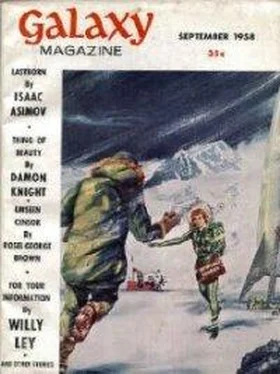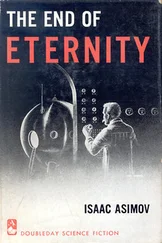Isaac Asimov - The Ugly Little Boy
Здесь есть возможность читать онлайн «Isaac Asimov - The Ugly Little Boy» весь текст электронной книги совершенно бесплатно (целиком полную версию без сокращений). В некоторых случаях можно слушать аудио, скачать через торрент в формате fb2 и присутствует краткое содержание. Год выпуска: 1958, Издательство: Galaxy Publishing Corporation, Жанр: Фантастика и фэнтези, на английском языке. Описание произведения, (предисловие) а так же отзывы посетителей доступны на портале библиотеки ЛибКат.
- Название:The Ugly Little Boy
- Автор:
- Издательство:Galaxy Publishing Corporation
- Жанр:
- Год:1958
- ISBN:нет данных
- Рейтинг книги:4 / 5. Голосов: 1
-
Избранное:Добавить в избранное
- Отзывы:
-
Ваша оценка:
- 80
- 1
- 2
- 3
- 4
- 5
The Ugly Little Boy: краткое содержание, описание и аннотация
Предлагаем к чтению аннотацию, описание, краткое содержание или предисловие (зависит от того, что написал сам автор книги «The Ugly Little Boy»). Если вы не нашли необходимую информацию о книге — напишите в комментариях, мы постараемся отыскать её.
. Published under the present title in
short story collection in Feb 1959.
The Ugly Little Boy — читать онлайн бесплатно полную книгу (весь текст) целиком
Ниже представлен текст книги, разбитый по страницам. Система сохранения места последней прочитанной страницы, позволяет с удобством читать онлайн бесплатно книгу «The Ugly Little Boy», без необходимости каждый раз заново искать на чём Вы остановились. Поставьте закладку, и сможете в любой момент перейти на страницу, на которой закончили чтение.
Интервал:
Закладка:
“I did not know then how long my investigations would take. I’m not a prophet,” said Ademewski heatedly.
Dr. Hoskins said, “You understand, Professor, we have limited space; we must keep specimens rotating. That piece of chalcopyrite must go back; there are men waiting for the next specimen.”
“Why can’t I have it for myself, then? Let me take it out of there.”
“You know you can’t have it.”
“A piece of chalcopyrite; a miserable five-kilogram piece? Why not?”
“We can’t afford the energy expense!” said Hoskins brusquely. “You know that.”
The technician interrupted. “The point is, Dr. Hoskins, that he tried to remove the rock against the rules and I almost punctured Stasis while he was in there, not knowing he was in there.”
There was a short silence and Dr. Hoskins turned on the investigator with a cold formality. “Is that so, Professor?”
Professor Ademewski coughed. “I saw no harm—”
Hoskins reached up to a hand-pull dangling just within reach, outside the specimen room in question. He pulled it.
Miss Fellowes, who had been peering in, looking at the totally undistinguished sample of rock that occasioned the dispute, drew in her breath sharply as its existence flickered out. The room was empty.
Hoskins said, “Professor, your permit to investigate matters in Stasis will be permanently voided. I am sorry.”
“But wait—”
“I am sorry. You have violated one of the stringent rules.”
“I will appeal to the International Association—”
“Appeal away. In a case like this, you will find I can’t be overruled.”
He turned away deliberately, leaving the professor still protesting and said to Miss Fellowes (his face still white with anger), “Would you care to have lunch with me, Miss Fellowes?”
He took her into the small administration alcove of the cafeteria. He greeted others and introduced Miss Fellowes with complete ease, although she herself felt painfully self-conscious.
What must they think, she thought, and tried desperately to appear businesslike.
She said, “Do you have that kind of trouble often, Dr. Hoskins? I mean like that you just had with the professor?” She took her fork in hand and began eating.
“No,” said Hoskins forcefully. “That was the first time. Of course I’m always having to argue men out of removing specimens but this is the first time one actually tried to do it.”
“I remember you once talked about the energy it would consume.”
“That’s right. Of course, we’ve tried to take it into account. Accidents will happen and so we’ve got special power sources designed to stand the drain of accidental removal from Stasis, but that doesn’t mean we want to see a year’s supply of energy gone in half a second—or can afford to without having our plans of expansion delayed for years.—Besides, imagine the professor’s being in the room while Stasis was about to be punctured.”
“What would have happened to him if it had been?”
“Well, we’ve experimented with inanimate objects and with mice and they’ve disappeared. Presumably they’ve traveled back in time; carried along, so to speak, by the pull of the object simultaneously snapping back into its natural time. For that reason, we have to anchor objects within Stasis that we don’t want to move and that’s a complicated procedure. The professor would not have been anchored and he would have gone back to the Pliocene at the moment when we abstracted the rock—plus, of course, the two weeks it had remained here in the present.”
“How dreadful it would have been.”
“Not on account of the professor, I assure you. If he were fool enough to do what he did, it would serve him right. But imagine the effect it would have on the public if the fact came out. All people would need is to become aware of the dangers involved and funds could be choked off like that.” He snapped his fingers and played moodily with his food.
Miss Fellowes said, “Couldn’t you get him back? The way you got the rock in the first place?”
“No, because once an object is returned, the original fix is lost unless we deliberately plan to retain it and there was no reason to do that in this case. There never is. Finding the professor again would mean relocating a specific fix and that would be like dropping a line into the oceanic abyss for the purpose of dredging up a particular fish.—My God, when I think of the precautions we take to prevent accidents, it makes me mad. We have every individual Stasis unit set up with its own puncturing device—we have to, since each unit has its separate fix and must be collapsible independently. The point is, though, none of the puncturing devices is ever activated until the last minute. And then we deliberately make activation impossible except by the pull of a rope carefully led outside the Stasis. The pull is a gross mechanical motion that requires a strong effort, not something that is likely to be done accidentally.”
Miss Fellowes said, “But doesn’t it—change history to move something in and out of Time?”
Hoskins shrugged. “Theoretically, yes; actually, except in unusual cases, no. We move objects out of Stasis all the time. Air molecules. Bacteria. Dust. About 10 percent of our energy consumption goes to make up micro-losses of that nature. But moving even large objects in Time sets up changes that damp out. Take that chalcopyrite from the Pliocene. Because of its absence for two weeks some insect didn’t find the shelter it might have found and is killed. That could initiate a whole series of changes, but the mathematics of Stasis indicates that this is a converging series. The amount of change diminishes with time and then things are as before.”
“You mean, reality heals itself?”
“In a manner of speaking. Abstract a human from time or send one back, and you make a larger wound. If the individual is an ordinary one, that wound still heals itself. Of course, there are a great many people who write to us each day and want us to bring Abraham Lincoln into the present, or Mohammed, or Lenin. That can’t be done, of course. Even if we could find them, the change in reality in moving one of the history molders would be too great to be healed. There are ways of calculating when a change is likely to be too great and we avoid even approaching that limit.”
Miss Fellowes said, “Then, Timmie—”
“No, he presents no problem in that direction. Reality is safe. But—” He gave her a quick, sharp glance, then went on, “But never mind. Yesterday you said Timmie needed companionship.”
“Yes,” Miss Fellowes smiled her delight. “I didn’t think you paid that any attention.”
“Of course I did. I’m fond of the child. I appreciate your feelings for him and I was concerned enough to want to explain to you. Now I have; you’ve seen what we do; you’ve gotten some insight into the difficulties involved; so you know why, with the best will in the world, we can’t supply companionship for Timmie.”
“You can’t?” said Miss Fellowes, with sudden dismay.
“But I’ve just explained. We couldn’t possibly expect to find another Neanderthal his age without incredible luck, and if we could, it wouldn’t be fair to multiply risks by having another human being in Stasis.”
Miss Fellowes put down her spoon and said energetically, “But, Dr. Hoskins, that is not at all what I meant. I don’t want you to bring another Neanderthal into the present. I know that’s impossible. But it isn’t impossible to bring another child to play with Timmie.”
Hoskins stared at her in concern. “A human child?”
“Anotherchild,” said Miss Fellowes, completely hostile now. “Timmie is human.”
Читать дальшеИнтервал:
Закладка:
Похожие книги на «The Ugly Little Boy»
Представляем Вашему вниманию похожие книги на «The Ugly Little Boy» списком для выбора. Мы отобрали схожую по названию и смыслу литературу в надежде предоставить читателям больше вариантов отыскать новые, интересные, ещё непрочитанные произведения.
Обсуждение, отзывы о книге «The Ugly Little Boy» и просто собственные мнения читателей. Оставьте ваши комментарии, напишите, что Вы думаете о произведении, его смысле или главных героях. Укажите что конкретно понравилось, а что нет, и почему Вы так считаете.









